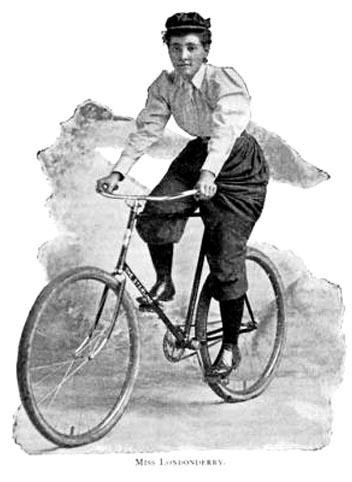City cycling can be a challenge at the best of times, but women cyclists in Cairo today fear sexual harassment more than road danger.

The fact that the sight of a woman on a bike is considered by many in Egypt to be socially unacceptable, is not stopping cycling advocates Go Bike from promtoing bicycles to both sexes.
Go Bike founder Mohamed Samy says: “We want bicycles to be a means for Egyptian girls to break the moulds of customs and traditions.”
Cycling suffrage
The barriers against women on bikes extend across the region. An outright ban on women cycling in Saudi Arabia was last year lifted. However, the patriarchy replaced it with permission for women to cycle for recreational purposes only, not as a primary mode of transportation. Women are permitted to ride bicycles on the proviso they wear a full-body abaya, are accompanied by a male relative, and stay within in parks and recreational areas.
Susan B. Anthony famously remarked that the bicycle did “more to emancipate women than anything else in the world”. Over 100 years ago in Britain and America, as women learned to ride bicycles they discovered freedom from the cumbersome fashions of the Victorian era as well as Victorian sensibilities. The restrictive corsets and heavy, multi-layered skirts petticoats and hoops of the era gave way to ‘rational dress’ in the form of bloomers.
 When Annie Londonderry embarked on a circumnavigation of the globe in 1896 (to settle a bet that a woman could not cycle around the world), she soon discarded the corset and heavy skirts considered acceptable sportswear at the time in favour the more liberating athletic bloomers.
When Annie Londonderry embarked on a circumnavigation of the globe in 1896 (to settle a bet that a woman could not cycle around the world), she soon discarded the corset and heavy skirts considered acceptable sportswear at the time in favour the more liberating athletic bloomers.
The rational dress society statement of purpose reads in part: The Rational Dress society protests against the introduction of any fashion in dress that either deforms the figure, impedes the movement of the body, or in any way tends to injure the health. It protests against the wearing of tightly fitted corsets, of high-heeled or narrow toed boots and shoes; of heavily weighted skirts, as rendering healthy exercise almost impossible.
However, the bloomer made enemies with women wearing them complaining of being ridiculed, fined, and even treated “like a prostitute” by local authorities and those who wished to push the boundaries further still, by wearing, for example, a short skirt, faced physical violence.
On 21st June 1895, the Newark Sunday Advocate ran the following article:
The Unique Cycling club of Chicago is all that its name implies. One of its laws is that on all runs bloomers and knickerbockers shall be worn, and two members who disobeyed this rule recently met with a punishment that they will not forget soon. Union park was the rendezvous for the last run, and 50 members turned out. The president, Miss Bunker, observed two women wearing short skirts over their bloomers.
“Take the skirts off,” ordered Captain Bunker.
“Indeed we won’t,” was the reply.
A crowd of 200 had collected to see the start. The president and the captain held a consultation, and then, taking several strong armed members with them, fell on the skirt wearers and stripped them down to their bloomers.
“It was done in all seriousness,” said Mrs. Langdon. “The club’s rules are made to be kept and not to be broken. Why did we take off the skirts in public? For no other reason but to make examples of the offenders. They publicly defied our rules and were published accordingly.”
| DON’TS FOR WOMEN RIDERS | from New York World 1895 |
|---|---|
| 1. Don’t be a fright | 2. Don’t faint on the road |
| 3. Don’t wear a man’s cap | 4. Don’t wear tight garters |
| 5. Don’t forget your tool bag | 6. Don’t attempt a “century” |
| 7. Don’t coast. It is dangerous | 8. Don’t boast of your long rides |
| 9. Don’t criticize people’s “legs.” | 10. Don’t wear loud hued leggings |
| 11. Don’t cultivate a “bicycle face” | 12. Don’t refuse assistance up a hill |
| 13. Don’t wear clothes that don’t fit | 14. Don’t neglect a “lights out” cry |
| 15. Don’t wear jewellery while on a tour | 16. Don’t race. Leave that to the scorchers |
| 17. Don’t wear laced boots. They are tiresome | 18. Don’t imagine everybody is looking at you |
| 19. Don’t go to church in your bicycle costume | 20. Don’t wear a garden party hat with bloomers |
| 21. Don’t contest the right of way with cable cars | 22. Don’t chew gum. Exercise your jaws in private |
| 23. Don’t wear white kid gloves. Silk is the thing | 24. Don’t ask, “What do you think of my bloomers?” |
| 25. Don’t use bicycle slang. Leave that to the boys | 26. Don’t go out after dark without a male escort |
| 27. Don’t without a needle, thread and thimble | 28. Don’t try to have every article of your attire “match” |
| 29. Don’t let your golden hair be hanging down your back | 30. Don’t allow dear little Fido to accompany you |
| 31. Don’t scratch a match on the seat of your bloomers | 32. Don’t discuss bloomers with every man you know |
| 33. Don’t appear in public until you have learned to ride well | 34. Don’t overdo things |
| 35. Let cycling be a recreation, not a labor | 36. Don’t ignore the laws of the road because you are a woman |
| 37. Don’t try to ride in your brother’s clothes “to see how it feels” | 38. Don’t scream if you meet a cow. If she sees you first, she will run |
| 39. Don’t cultivate everything that is up to date because you ride a wheel | 40. Don’t emulate your brother’s attitude if he rides parallel with the ground |
| 41. Don’t undertake a long ride if you are not confident of performing it easily | 42. Don’t appear to be up on “records” and “record smashing.” That is sporty. |
The ethical choice
The ETA was established in 1990 as an ethical provider of green, reliable travel services. Over 30 years on, we continue to offer cycle insurance , breakdown cover and mobility scooter insurance while putting concern for the environment at the heart of all we do.
The Good Shopping Guide judges us to be the UK’s most ethical provider.

0 Comments View now